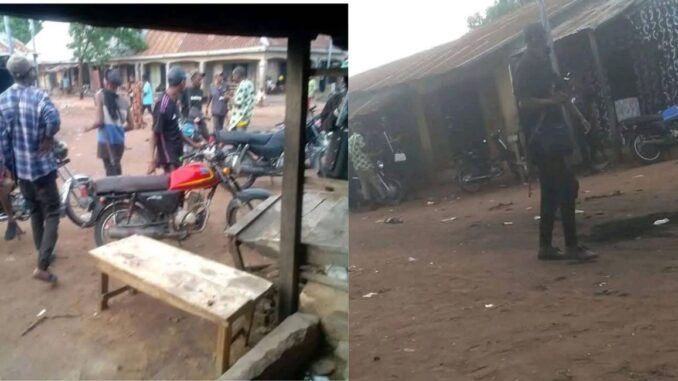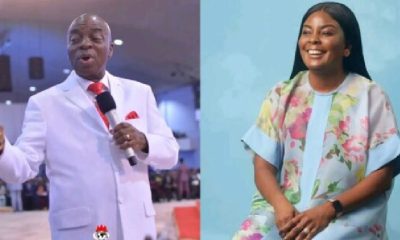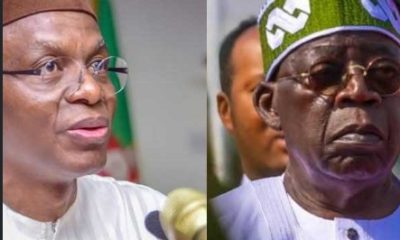News
Obasanjo reveals how ICPC, EFCC secured debt relief for Nigeria

Former President Olusegun Obasanjo has outlined the steps he took to secure substantial debt relief for Nigeria during his tenure from 1999 to 2007.
He noted that the creation of the Independent Corrupt Practices & Other Related Offences Commission, ICPC, and the Economic and Financial Crimes Commission, EFCC, were part of his policy moves that convinced Nigeria’s creditors to write off debts.
Obasanjo highlighted the challenges he faced upon assuming office, including Nigeria’s debt servicing burden of $3.5 billion annually and a total debt of approximately $36 billion, while the nation’s reserves stood at a modest $3.7 billion.
Obasanjo revealed that he successfully negotiated debt forgiveness by convincing international lenders of his administration’s commitment to channeling the funds saved into developmental projects aimed at sustainable growth.
He emphasised that presenting a credible and transparent plan was key, as global financial institutions required assurances that forgiven debt would foster positive development outcomes.
Reflecting on the current state of leadership in Nigeria, Obasanjo expressed concerns about a perceived decline in ethical leadership and effective planning.
He stressed that without a genuine development-oriented approach, requests for debt forgiveness are unlikely to gain international approval.
“When I became elected President of Nigeria, one of the things that worried me and that I wanted to do something about was debt relief. The quantum of debt that we were carrying, the burden was too heavy. We were spending $3.5bn to service debt, yet the quantum was not going down and I believed that we should seek debt relief.
“Many people inside and outside Nigeria thought it was a bad dream but I was convinced. I went to the World Bank and I started talking to our creditors,” Obasanjo said.
He explained that in his moves he found why the world lenders “did not feel that they owe us”, disclosing that they give consideration “when you make your case if they find that you are genuinely showing and trying to carry out what they call reforms, and the reforms they are asking us to carry out are reforms we should ordinarily carry out.
“How do you have public service delivered, how do you drastically reduce corruption, how do you manage your finances? And all these are reforms that nobody needs to tell us to do.”
Obasanjo noted that international lenders are more willing to engage with nations demonstrating accountability, stating, “when the world lenders believe that you’re doing what they expect of you, they will listen and you may even find the world more sympathetic than you thought. The world does not feel it owes you anything but if you show responsibility.”
He said, “I took over and I found they were using over $3.5b to service debt, that’s a lot of money but the problem was that the quantum of debt was not going down because that amount of money was being spent together to pay interests and to pay what they call penalties, because (for) any default you pay penalties and you can’t show good course for the debt.”
Illustrating the misuse of loans, he referenced a state project where a loan intended for carpet production was fully spent without any work being done on-site. He was told, “a small print which says once you sign, how the money is spent is not the responsibility of the lender, it’s the responsibility of the borrower.”
“With all these, I was convinced that I could make a credible case, a serious case, and then of course on the other hand they wanted me to do what’s right that I should not continue with the irresponsibility of the past, the corruption of the past.
“The point is that the international community know us more than we know ourselves and at times we bow our heads like ostrich in the sand. They know what you do,” he said.
The former president said the creation of the Independent Corrupt Practices & Other Related Offences Commission and the Economic and Financial Crimes Commission was borne out of the move to satisfy the course to secure debt forgiveness, as part of reforms to prove readiness to eliminate the stench of corruption and mismanagement.
“Of course, if you remember one of the first bills that I sent to the National Assembly was the ICPC bill to fight corruption. I followed that up later with the EFCC bill, again to fight corruption because the international community knows what you’re doing.
“So, convinced of the fact that we could not sustain the amount of money we were spending to service debt with the quantum of debt not going down, anytime we defaulted they gave us heavy penalties, and my determination to do what would convince Nigerians internally and convince our development partners/creditors, then it took almost six years before we got there and at the end of the day, they were satisfied.
“I even gave them assurance that the money saved from our debt relief would be spent on the sustainable development goals and that was been done.
“The world out there doesn’t feel that it owes you anything but if you do what is right, there’s a lot you can get out of the world,” the former president explained.
Obasanjo who lamented a situation “where leaders rather than manage the economy and prosperity of the nation for all, they manage it for themselves,” said, “Where there is no development you are actually inviting problems.”
He explained “When I came in 1999, I met $3.7bn in the reserves, and as I have told you, we were spending $3.5bn to service debt. That’s all we have. When I came in we had debt overhand of close to $36bn, by the time we left eight years later, with the debt relief and clearing what we had to clear, the quantum of debt I left was about $3.5/3.6bn from over about $36bn dollars.
“At the same time, the reserves that was $3.7bn went to $45bn, at the same time we had what we call the excess crude, the amount in excess between what we budgeted at which we seek to sell crude oil and we actually sold it.
“Normally, we were conservative in budgeting, we had about $25bn (in the excess crude account). When you add that to the reserves, we are talking about $70bn dollars.”
He however lamented, “The point is that I left in 2007, between 2007 and 2024 all that amount of money had gone. Not only that, all that money they made during that period had gone and today we own more than we owed when I came to government in 1999. Why? Poor leadership, poor management of economy, corruption galore, pervasive corruption.”
Expressing his disappointment in successive administrations, Obasanjo decried “the deficit of leadership” that has hindered the nation’s progress, adding, “I feel bad.”
“As I always say, leadership is not a thing that you pick on the road, and not everybody is given to it. When we identify leadership we should appreciate it and use it to good advantage…
“The point in Nigeria particularly is that we take two steps forward, we take one sideways and take two or three backward, that can’t get us far.
“Leadership is something we should pay attention to. What do you say of a Nigerian president who came to office without a plan? And then he woke up and just said three-point plans. What are the plans, what are they going to achieve, and who are the people who have worked on it? You came and just opened your mouth and make a pronouncement on something that has not been studied,” Obasanjo said.
VANGUARD
News
Reps Tackle CBN, OAGF Over Missing Grants, Bailout Funds

According to him, such financial mishandling not only disrupts critical public services and projects but also results in major losses to the nation’s purse—resources that could have been channelled into crucial services and developmental efforts, as laid out in Section 14(2)(b) of the Constitution.
Speaker Abbas, thereafter setup a Special Committee to be chaired by Rep. Chinedu Martins to immediately launch a probe into the “Utilisation of take-off grants, bailout funds, and interventions allocated to MDAs, government institutions, and GOEs from 2015 to present.”
News
Abuja light rail project must be commissioned on May 29-Wike vows

The FCT Minister, Mr. Nyesom Wike, expressed satisfaction with the progress on the Abuja light rail project, reaffirming its May 29 delivery as sacrosanct.
He made these assurances after inspecting the ongoing construction of access roads to the train stations on Wednesday, from Metro Train Station in the Central Area to Nnamdi Azikiwe International Airport, Abuja.
Reassuring journalists accompanying him, the minister reiterated that President Bola Tinubu would commission the rail project on May 29 to mark his second year in office.
The visited stations were Wupa station near Idu and Bassanjiwa station near the airport.
“This is part of our routine inspection of ongoing projects to see the contractors’ progress,” Wike explained.
“We are working day and night to fulfill our promise to President Tinubu and FCT residents. By May, Mr. President will ride on the Metro line.”
News
Just in: Alleged Herdsmen Armed With AK-47 Rifles Take Over Communities In Benue State

Gunmen suspected to be Fulani herdsmen are currently invading some communities in the Ukum Local Government Area of Benue State.
According to sources, the herdsmen armed with AK-47 rifles stormed the community around 04:15pm on Thursday.
“Our lives are in danger this evening, armed Fulani herdsmen, about 600 in numbers have taken over our communities this evening,” a resident told SaharaReporters.
“They’re currently moving around towns in Ukum Local Government Area of Benue state. No security personnel at all, Governor Alia didn’t send security, they said operation will start soon once they (herders) have observed the place.”
The insecurity situation in Benue has been alarming in recent weeks with attacks from gunmen suspected to be herdsmen.
The media had reported that suspected herdsmen again unleashed terror in Benue State, attacking three communities in Otukpo Local Government Area (LGA) on Wednesday, just a day after 11 people were killed in a deadly raid on Otobi community.
The latest victims of the escalating violence were Emichi, Odudaje, and Okpamaju, communities that had previously suffered an attack in February, which left five people dead.
However, the renewed attack has created fear and mass displacement among residents, with women and children fleeing to safety.
Local sources say the death toll from the fresh attack remains unclear, but several casualties are feared.
-

 News9 hours ago
News9 hours agoBREAKING: Unknown gunmen reportedly storm Senator Natasha’s family residence
-

 News12 hours ago
News12 hours agoSnub story on removal of Rivers Sole Administrator, it’s FAKE-Chief Registrar
-

 News17 hours ago
News17 hours ago“How my father escaped assassination” – Bishop Oyedepo’s daughter
-

 News18 hours ago
News18 hours agoFG expresses sympathy for CBEX victims, urges a united effort to combat Ponzi schemes
-

 News11 hours ago
News11 hours agoSAD! Again, Alleged Herdsmen Attack Three Benue Communities
-

 Politics11 hours ago
Politics11 hours agoPDP govs are jokers, can’t stop coalition train, Atiku boasts
-

 News3 hours ago
News3 hours agoAbuja light rail project must be commissioned on May 29-Wike vows
-

 News24 hours ago
News24 hours agoEl-Rufai labels Tinubu’s government ‘worst in Nigeria’s history’





